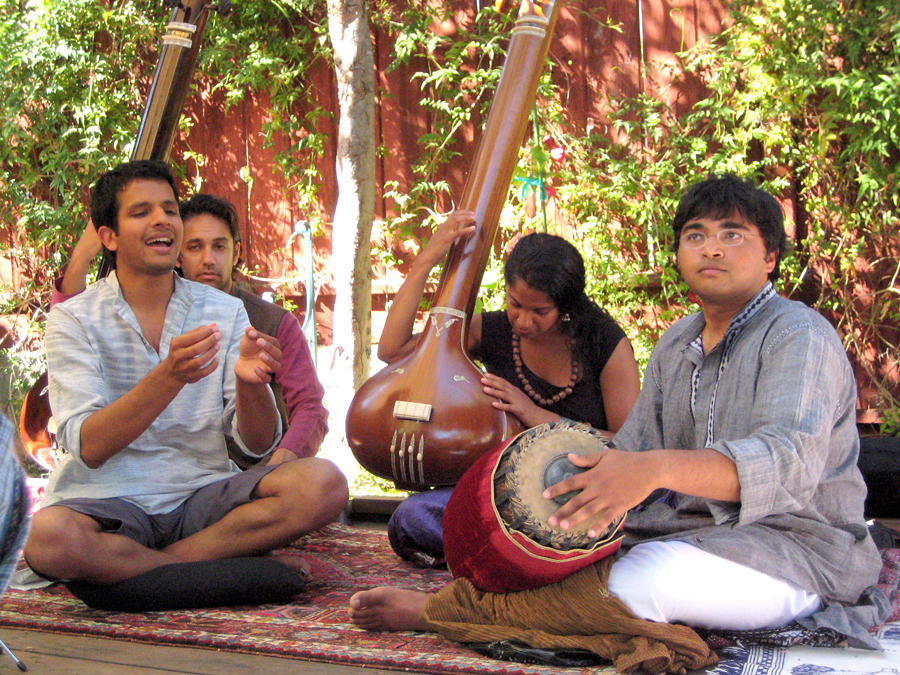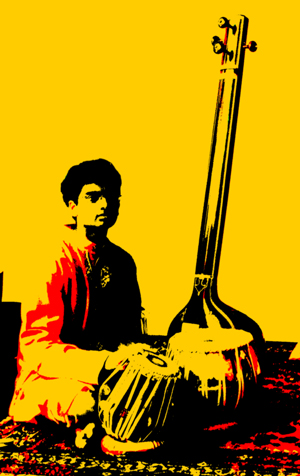Portraits of Artists — May 18, 2010 4:02 — 0 Comments
New Directions in Indian Classical Music

Voice Gautam Tejas Ganeshan + Mridangam Barrel Drum Anantha R. Krishnan + Tanpura Drone Lutes Deepa Preeti Natarajan
Gautam Tejas Ganeshan is a vocalist who sings without lyrics; performing in a style with influences from South Indian music. He is the executive director of the Sangati Center, a performance hall that hosts concert level Indian Classical Music in the Mission. On Thursday nights he holds classes on Indian Classical Theory and Indian Classical Voice at Zambaleta.
I recently sat down with Gautam to talk to him about music, the robustness of Indian Classical Music in the Bay Area, and his group: New Directions in Indian Classical Music.
What is it about music that is important to you?
Music is a special art form in that it strongly features time (pitch, meter, iteration— all are essentially time-mediated), and it also strongly features human emotion, so it straddles the objective-subjective continuum gracefully.
Tell me a little bit about what you are doing with your group: New Directions in Indian Classical Music.
First off, I think our name is a bit pretentious: New Directions in Indian Classical Music. Really, I would like to just call it “Good Music That I Play.” However, that doesn’t create a very good image of what we do in the mind of someone who hasn’t heard us play, so I have settled on this pretentious name. New Directions in Indian Classical Music more or less gives an impression of what you can expect to hear at one of our shows.
The new directions are: typically I don’t use words, very often I improvise the piece or the entire concert, and there is somewhat more flexibility in form than “traditionally” found Indian music. I allow my ideas to be expressed in the music, rather than creating music according to a traditional format.
A lot of people that practice Carnatic music feel the music without necessarily knowing or understanding the original meaning. In my New Directions group we just go for that, and don’t pay any heed to whether or not we are representing the tradition of singing these particular songs. So the forms that I use definitely are related to these song forms in that they build in the same way, and the cycles happen similarly to how the poetic meter would cycle— but I treat them as pure music.
Tell me a little bit about your style of singing.
I sing “pure” music, as opposed to music+poetry, or music-that-represents. This means that it is valuable in itself, rather than referencing anything else. One important thing is that there are no words, so there are no extra-musical meanings imported into the music— all the “meaning” comes from within. So, I think anyone can hear the music and find it beautiful, regardless of acculturation.
There is a universality to my music that is intentional. I say the
name is pretentious, so I am kind of disowning that, but I do intend
that my music is universal in the sense that anybody who comes to it
should be able to relate to it. I think that a lot of classical Indian
vocal music doesn’t have that quality because it is in a different
language, and it applies to certain religious beliefs that are patently
not universal. Some people may have not grown up worshiping the Hindu
god Rama. If you sing about Rama people are going to say, “Well, it is
beautiful music— but, it is not my thing.” But I sing about… I don’t
know what I sing about, but I do sing something, and I think that
everyone uses their voice and so they can relate with the human cadence
of a man producing sounds with his voice, it is on that level I intend
for my singing to be meaningful.
What is the Sangati Center?
Indian Classical Music is alive and well, and very robust in the United States. A surprising number of 2nd generation Indian kids born in America, like myself, take up Indian Classical Music with a real seriousness so that they can become concert performers. Sangati Center provides a platform for part time performers, and up and coming musicians who haven’t yet made a name for themselves- to be acknowledged and honored.
At the Sangati Center we have professional performers come from India and many other parts of the world; but right here in the bay area there is a startlingly vibrant community of concert-level musicians. This community has provided us with a large variety of musicians every week for the last four years.
You can find out more at the Sangati Center’s website, as well as a list of upcoming concerts.
Gautam holds classes on Indian Classical Theory & Indian Classical Voice at Zambaleta.






